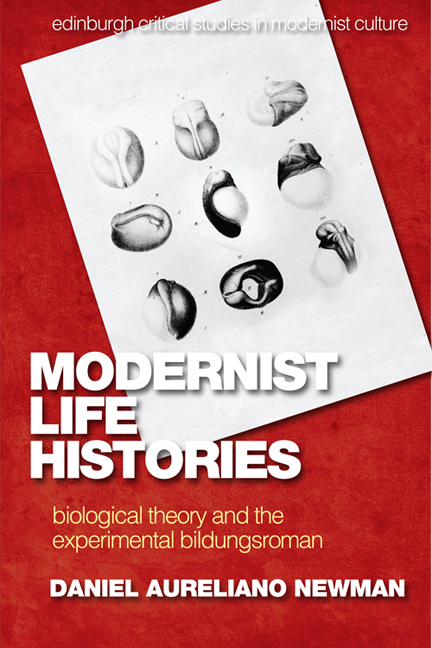Book contents
- Frontmatter
- Contents
- List of Figures
- Preface
- Acknowledgements
- Series Editors’ Preface
- List of Abbreviations
- Introduction
- 1 Bildung, Biology and the Narrative Structure of Development
- 2 A Portrait of the Artist as a ‘Biologist in Words’: Language, Epiphany and Atavistic Bildung
- 3 Mendelian Inheritance, ‘Eternal Differences’ and Entropy in Howards End
- 4 ‘Tampering with the Expected Sequence’: Heterochrony and Sex Change in Orlando
- 5 Anachrony, Neoteny and the ‘Education of an Amphibian’ in Eyeless in Gaza
- 6 Beginning Again: Darwin’s Caterpillar from George Eliot to Beckett
- Conclusion
- Bibliography
- Index
Preface
Published online by Cambridge University Press: 23 April 2021
- Frontmatter
- Contents
- List of Figures
- Preface
- Acknowledgements
- Series Editors’ Preface
- List of Abbreviations
- Introduction
- 1 Bildung, Biology and the Narrative Structure of Development
- 2 A Portrait of the Artist as a ‘Biologist in Words’: Language, Epiphany and Atavistic Bildung
- 3 Mendelian Inheritance, ‘Eternal Differences’ and Entropy in Howards End
- 4 ‘Tampering with the Expected Sequence’: Heterochrony and Sex Change in Orlando
- 5 Anachrony, Neoteny and the ‘Education of an Amphibian’ in Eyeless in Gaza
- 6 Beginning Again: Darwin’s Caterpillar from George Eliot to Beckett
- Conclusion
- Bibliography
- Index
Summary
This book reflects a belief acquired during my scientific training and fostered by my readings of modernist literature: that experiment is the best way of resisting the force of habit which reduces complex realities to simple myths, experience into slogans, cultural constructs into immutable truths and curiosity into complacency. Many literary innovators have said as much. And while T. H. Huxley and Alfred Whitehead defined science as disciplined common sense, I agree with literary critic Gillian Beer, who counters that ‘most major scientific theories rebuff common sense’ (2000: 1), and with developmental biologist Lewis Wolpert, who insists that science is ‘counterintuitive’ and therefore ‘requires a conscious awareness of the pitfalls of “natural” thinking’ (1992: 1). Few statements better capture the vision of biology and literature in Modernist Life Histories: Biological Theory and the Experimental Bildungsroman.
Focusing on biology, this book leaves the main current of Modernism and Science Studies, which tends to favour the New Physics of relativity and quantum mechanics. Physics was certainly important to the modernists, but ‘biology’, writes Aldous Huxley in Literature and Science, ‘is more immediately relevant to human experience than are the exacter sciences … Hence, for all writers, its special importance’ (1963: 67). Taking Huxley's lead, I explore how early twentieth-century biology informs modernist experiments with the Bildungsroman. My focus is motivated by the genre's exemplary status among what Fredric Jameson calls ‘“natural” forms’ (1982: 132), plot structures so deeply embedded in our culture that we can no longer detect their constructed nature, or their ‘vitality’ (Jameson 1982: 132). Modernist Life Histories seeks this ‘vitality’ in biological allusions and narrative structures, often finding them in seemingly trivial details: James Joyce's ‘law of heredity’ (PA 230), E. M. Forster's ‘throw back’ (HE 320), Aldous Huxley's ‘axolotl’ (EG 612) and Samuel Beckett's ‘Darwin's caterpillar’ (MU 122; W 194). Such allusions are just the visible part of a veritable intertextual iceberg, a substantial and systemic literary dialogue with biological models of development and evolution.
Not knowing where such allusions would lead was one of the greatest thrills of researching what would become Modernist Life Histories. As Gérard Genette quips, ‘the inconvenience of “research” is that by dint of searching you can find … what you weren't looking for’ (1982: 8).
- Type
- Chapter
- Information
- Modernist Life HistoriesBiological Theory and The Experimental Bildungsroman, pp. vii - ixPublisher: Edinburgh University PressPrint publication year: 2018



